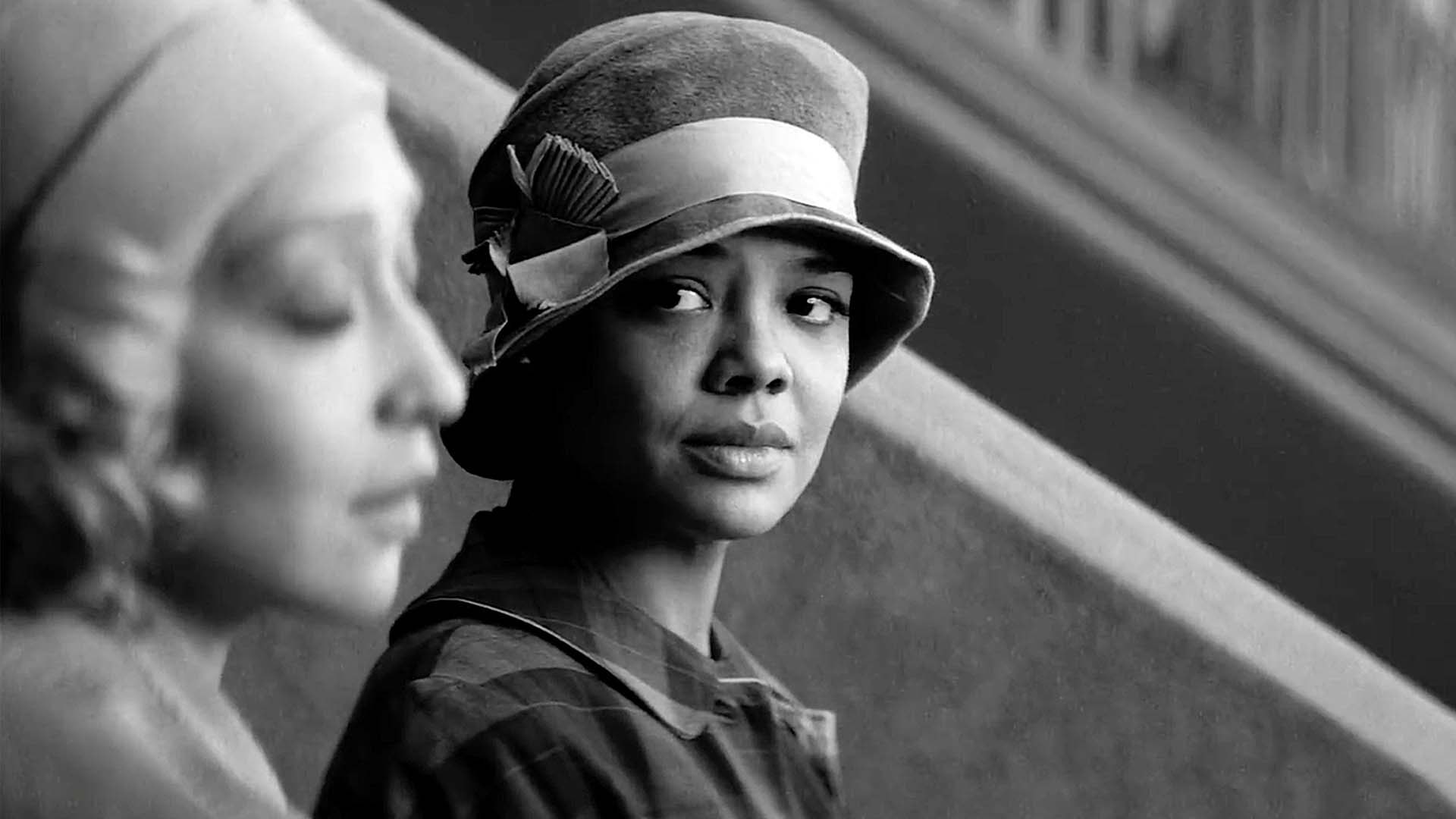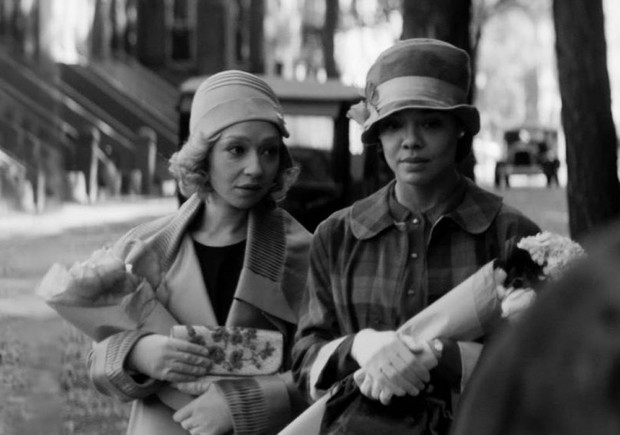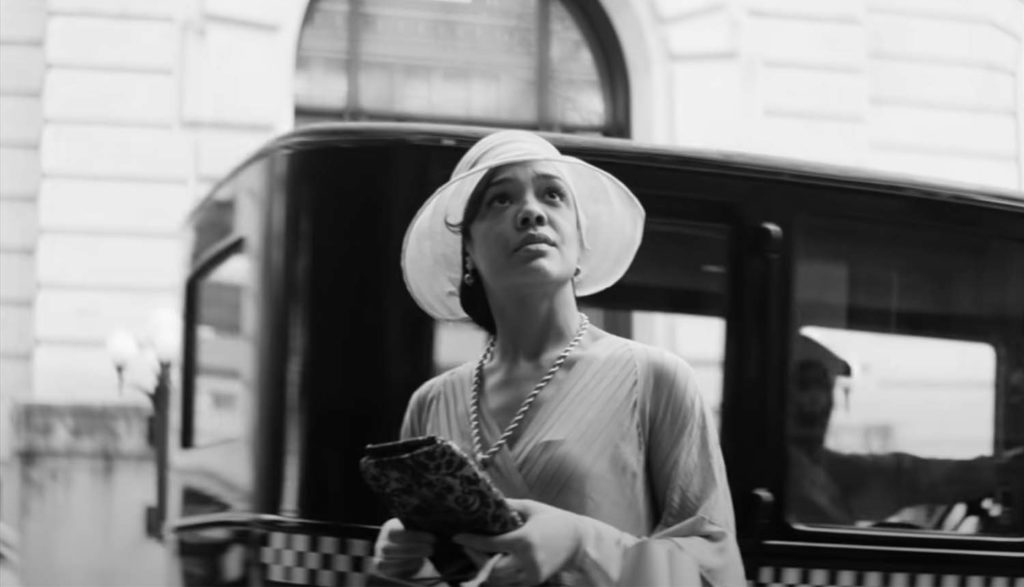
While talking with a friend of hers at a dance, Irene (Tessa Thompson) says, “We’re all of us passing for something or other, aren’t we?” It’s the line that stands out the most in the film, the one that universalizes the search for identity and security in our ever shifting experience. Passing is the directorial debut of Rebecca Hall (who also wrote the screenplay) and is based on the novella from 1929 by Nella Larsen. It is a film that not only looks at the issue of race in America in the 1920’s, but delves deeper, interrogating the ways human beings have always played with identity and belonging.
The film begins blurry. We don’t have a sense of who we are, where we’re going. We just hear voices, and see feet ahead of us walking. We arrive at a store, where a man drops an object and the two women whose feet we were following help him pick it up. We extend our hand and help them as well. We ask about a toy at the counter, which is unable to be found, and walk outside, only to see a man across the street collapse. His crisis is our crisis. Stepping back from the first-person experience, we learn we are a Black woman. This first scene has her passing as a white woman in an upscale area of Chicago. Irene has taken a moment and stepped out of her identity as a Black woman, functioning as someone else. Does this man’s crisis symbolize the momentary death of her identity? Has her identity temporarily collapsed, or is this what happens when we attempt to go beyond identity?
Irene lives in Harlem with her husband, Brian (Andre Holland), who works as a doctor. They live what appears to be a happy middle-class life. They live in a beautiful brownstone with their two children, and make enough money to have their own maid. The film depicts what happens when an old friend of Irene’s from school, Clare (Ruth Negga), comes back into her life.
In a literal sense, the film tells the story of passing in the sense that it has been understood in American history. Passing refers to the way that a member of an oppressed group will pretend to be a part of the dominant group to gain social advantage. In this instance, Black Americans would pretend to be white in order to gain social advantage. In the 1920’s, Jim Crow laws were still dominant in the US, which meant that Black Americans were denied the basic rights they should have had for being human. They were legally barred from many of the privileges awarded to white Americans, simply for the dumb luck of being born white. Lynching was still happening regularly. Racial violence and destruction were common throughout the US at this time, with mobs of white people destroying property and murdering Black people in order to safeguard their power. Throughout the film, Brian keeps talking about wanting to move out of the country, and at one point, he tries to teach his two sons the hard truth about racism in the US, so that his sons can stay safe.
The film goes beyond the historical circumstances, though. It asks the questions of how we construct identity, what it means for us as we live our lives, and the poignant questions that arise when we feel that sense of identity start to crumble, like a castle built of sand.

Human beings learn about reality through experience. They take in and assimilate information about the world in order to better predict how to get to where they want to go, and to know how to act in future situations. We generalize about people and situations in order to effectively move through them in the future. We put people in boxes and categories to be able to know who they are and how we should act around them. But is reality so simple?
Reality, as it is, is messy. It cannot be schematized through clean and crisp categories. We do this to be able to understand and make sense of the world, but it will always break down upon finer examination. Boundaries are fluid and porous. Categories are always shifting, ever breaking down and re-assembling themselves into new creations and understandings of the way things are or can be.
James Baldwin understood this truth. He was one of the finest writers of the 20th century, and a brilliant defender of the rights of Black people. One of his most remembered moments is a famous debate at the University of Cambridge with the creator of modern conservatism William F. Buckley. His most famous work is probably The Fire Next Time, a powerful invective against racism. In it, he writes,
“Perhaps the whole root of our trouble, the human trouble, is that we will sacrifice all the beauty in our lives, will imprison ourselves in totems, taboos, crosses, blood sacrifices, steeples, mosques, races, armies, flags, nations, in order to deny the fact of death, which is the only fact we have. It seems to me that one ought to rejoice in the fact of death – ought to decide, indeed, to earn one’s death by confronting with passion the conundrum of life. One is responsible to life: It is the small beacon in that terrifying darkness from which we come and to which we shall return. One must negotiate this passage as nobly as possible, for the sake of those who are coming after us.”
Baldwin’s choice of words here is fascinating. He says that we “imprison ourselves” in these identities. Baldwin saw these identities as ways of holding us back, keeping us from being fully fledged humans. In other words, identity holds us back, limiting our freedom by creating walls and barriers beyond which we cannot go. Think of the way the film is in 4:3 aspect ratio, as well as black and white, to suggest a claustrophobic experience of social categories. During a conversation, Clare says to Irene, “I don’t expect you to understand. You’re happy. You have a true, good life. And you’re free. Free and safe. Safe. I don’t even know what that is anymore.” Irene responds, “I’m beginning to believe that no one is ever completely happy, free, or safe.”
Baldwin explores this freedom in his novel Giovanni’s Room, about an engaged man who has a passionate affair with a man he meets in Paris. He writes,
“…nothing is more unbearable, once one has it, than freedom….But people can’t, unhappily, invent their mooring posts, their lovers and their friends, any more than they can invent their parents. Life gives these and also takes them away and the great difficulty is to say Yes to life.”
The freedom to be whoever you are, whoever you want, whoever you would like, is liberating in many ways, but it can also be overwhelming, especially when you live in a society like the US, where maximizing the amount of choices possible is a sacred creed. But at a certain point anxiety sets in. Who should I be? What should I do for work? What should I read? There are hundreds of incredible movies to watch on Netflix, which one should I watch? Watching one means not watching all the others. Choosing one career means forgoing others. Same with spouses. Without anchors in our lives, the waves of reality pull the boat away. With so many choices in who we could be, how are we supposed to know what the right answer is?

In the novella, Larsen wrote,
“Above everything else she had wanted, had striven, to keep undisturbed the pleasant routine of her life. And now Clare Kendry had come into it, and with her the menace of impermanence.”
Impermanence. Constant change. The flux of experience and the ever-shifting nature of how human beings imagine their society. This impermanence is what afflicts Irene in the film, when the root, the anchor, the mooring post, of the life she believes she should have falls apart when Clare enters back into it.
While the concrete details of the film examine the idea of passing in racial terms, there is much to suggest that this is not the only commentary it is making. Many shots, including one during the dance scene which tenderly lingers on Clare’s open back, suggests a mutual physical attraction between Irene and Clare.
This opens up the idea of passing into a much broader veranda, opening up to us the ideals that we all try to aspire to be. The US has an ideal of the perfect middle class family. Picture the Leave It To Beaver family, or the opening sequence of David Lynch’s Blue Velvet, which shows perfectly manicured lawns and a picket white fence, a perfect family with a dog as a firetruck drives by, with the firefighter smiling and waving in suburban bliss. Clare does what she can to maintain the perfect housewife image; a doctor husband with two sons living in a beautiful brownstone while coordinating community dances and having perfect family dinners. But is this what Irene wants? Or is this the life she believes she is supposed to have? Being a part of the LGBTQ community was a taboo subject in the 1920’s. They could not be nearly as open about their sexual orientation for fear of violence or social expulsion.
In the novella, Larsen wrote,
“Security. Was it just a word? If not, then was it only by the sacrifice of other things, happiness, love, or some wild ecstasy that she had never known, that it could be obtained? And did too much striving, too much faith in safety and permanence, unfit one for these other things?”
The safe option for our lives is to live how everyone else lives. To find a partner, a good steady job, and have children. To stay within social bounds of belief and thought, meaning and behavior. What is it we would give up for security and safety? A life of passion? A life of true love, perhaps with the person that society tells us we should not be with?
Passing examines the eternal question of identity. Throughout the film we feel imprisoned within these prisons that we have created ourselves, barring ourselves from seeing the full and terrifying picture of humanity. The film does not give us answers, or show us how we should be living, but it does a brilliant job of asking the questions.